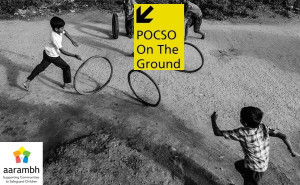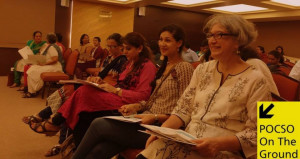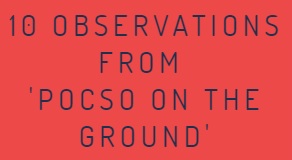[Aarambh Talk] A New Beginning
Change – we are all in it together.
Over the last decade Child Rights activists across India consistently demanded that crimes of sexual violence against children must be dealt with separately and not under laws that were applicable to adults. Individuals and civil society organisations working with children gathered in groups across the country. They were driven by the vision of creating one of the most comprehensive laws on child protection. The various groups offered up their experiences, suggestions and ideas and out of the resulting debate and dialogue, the Law on Protection of Children From Sexual Offences (POCSO) came into effect in late 2012.
It was a landmark moment in the history of Child Rights in the country. The vision had turned into reality. Change was made. And as one movement reached its conclusion, it was a starting point for another.
Over the last couple of years we realize that like every other law in the country POCSO brought with it a new set of challenges. There is a lack of awareness about its existence even among key stakeholders. Some of its provisions such as ‘placing the burden of proof on the accused’ and ‘mandatory reporting’ seem too radical for existing frameworks and mindsets. The infrastructure and practices being followed then seemed too primitive to accommodate the child safety procedures prescribed within the law. Confusion ensued.
In the midst of these confusions, many organizations made several innovative efforts to ensure that the law would translate from the paper to the ground. From ensuring that the child friendly practices were followed to defining the role of support persons for the child, these organizations worked with the law and gave it clarity. They strengthened the systems and made certain that the best interests of the child were taken care of.
Such experiences and efforts are the foundation of the next wave of change. These voices from the ground, rooted in the physical reality of things, will help us put together a vision of the future where all children are safe, secure, protected and where justice is delivered.
In the light of this moment, ‘POCSO on the Ground’ is an effort by Aarambh to provide a platform to these, sometimes unheard, voices of change.
Drawing in equal parts from Lennon and Gandhi, ‘POCSO on the Ground’ is where we ‘imagine the change we want to bring’.
The 1st Edition
In the 1st edition of ‘POCSO on the ground’, organizations that have worked with police, the health sector and the judiciary in implementation of POCSO were invited to share their experiences.
The consultation was held at YMCA International House, Mumbai on the 11th of May 2015. 70 individuals, some of them representing (20) civil society organizations, attended the consultation.
The keynote address was presented by Child Rights Advocate Maharukh Adenwalla. She offered a perspective on some of the issues like age of consent and mandatory reporting.
The morning session featured voices of groups that have worked closely with the health sector (CEHAT, Mumbai & ENFOLD, Bangalore), police (Special Cell for Women & Children, Maharashtra & SNEHA, Mumbai) & courts (CSJ, Delhi & Justice and Care).This session was followed by an open discussion on key issues concerning the law and grey areas raised by speakers in the morning session. UNICEF’s Alpa Vora summed up the events of the day and spoke on the way forward.
The day ended with the formation of three working groups. We are currently formulating terms of reference for each of these groups which will take the observations of the day back to the drawing board.
And then the process begins.
Stay Tuned.
1. The detailed listing of various offences has led to many more cases being registered.
2. Most voices were in support of Mandatory Reporting and agreed that systems need to be thought out and put in place for the provision to function.
3. The health sector spoke about the urgent need for uniform practices and protocols for doctors while taking history and recording cases of sexual abuse.
4. Most speakers pointed out that the police have had an increasing level of awareness with regard to POCSO.
5. Delayed justice, stressful environments and overburdened systems are causing victims to lose faith in justice delivery.
6. Attention needs to be paid as to how POCSO is unfolding in rural India.
7. There was an urgent need for the roles of Support Persons and Child Protection Units to be clearly defined.
8. We need to study what happens to the victims post justice delivery and assess if POCSO places enough emphasis on rehabilitation.
9. There is a need to look at the POCSO Act in its entirety and identify faulty provisions.
10. Collaboration among stakeholders can help overcome roadblocks.










